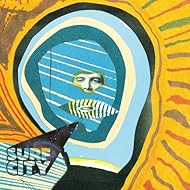
Scott & Charlene's Wedding - Any Port in a Storm (****)
If the opening one-two of Junk Shop and Lesbian Wife didn’t offer enough cues – the former all languid guitar and sneers, the latter breezier despite lyrical loneliness – the third track on Any Port In A Storm lyrically nails Scott and Charlene’s Wedding’s schtick. “I haven’t done much changing in what I love since 1993,” drawls Craig Dermody over a top-of-the-class take on the It’s A Shame About Ray school of slacker-rock, and true to his word the influences are of a comparable vintage throughout, with Dando and Malkmus acting as key spirit guides.
The second foundation of Dermody’s sound isn’t a time but a place, with the relocated Aussie continuing to display love for (and anxieties about) his adopted New York, from Fakin’ NYC's messy pop hooks to Gammy Leg’s grisly postcard home. But despite the borrowed touchstones, Any Port… avoids feeling second-hand thanks to Dermody’s keen conviction and ear for a winning chorus.
Out now

Barbarossa - Bloodlines (****)
'We can’t forget where we’re coming from,' sings James Mathé (AKA Barbarossa) on single Pagliaccio, and he’s right: appreciating the new direction shown on Bloodlines requires a bit of context. Five years ago, Fence debut Chemical Campfires offered string squeaks and finger-picked lullabies; now, the acoustics have been (largely) replaced with a battery of electronics, with drum machines, keyboards and synths joining reverb-treated guitar lines.
What seems on paper a comprehensive aesthetic overhaul in reality sounds far more natural, possessing the same intimacy and pop outlook as before, just painted in fresh tones. From Turbine’s crisp funk to the hip-hop-referencing beats of The Load, Bloodlines exudes stylistic freedom, and with lines like 'I would break and shatter every bone to work this out' (from S.I.H.F.F.Y), there’s lyrical intrigue to match the impressively varied arrangements. A marginal slump in the latter half aside, Bloodlines is a slow-burning triumph.
Out 5th August

The Civil Wars - The Civil Wars (**)
With three Grammys on their mantelpiece, The Civil Wars’ slick output has no shortage of admirers. The secrets of their success are obvious: both Joy Williams and John Paul White have expressive voices that harmonise beautifully, and when their muses align they have an instinctive feel for timeless country-soul songwriting (for instance, tumultuous ballad The One That Got Away – made more interesting in light of the duo’s public fall-out last year, which led to tour cancellations citing “internal discord and irreconcilable differences”).
However, for every drop of glossy appeal there’s a gallon of blandness to swallow first – and when they get it wrong (e.g. an insipid cover of Smashing Pumpkins’ Disarm), they get it very wrong. Ultimately, for a duo whose professional partnership was already assumed fractured-beyond-repair, it’s the workmanlike-aspects of this state of the union address that prove most damning, suggestive as they are of a musical relationship coasting on fumes.
Out 5th August
















